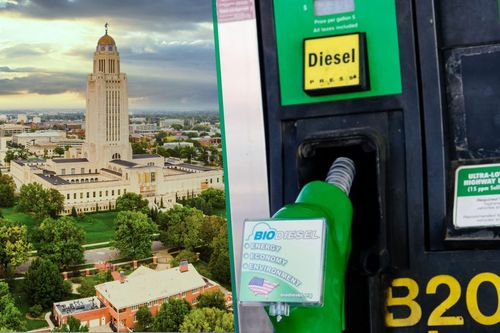City of Lincoln to fuel municipal fleet with biodiesel

SOURCE: Nebraska Soybean Board
May 7, 2024
BY Nebraska Soybean Board
The City of Lincoln has been awarded funding from the Nebraska Soybean Board to begin incorporating B20 biodiesel in its municipal fleet.
This biodiesel incentive program marks a significant milestone in the city's ongoing commitment to sustainability and reducing carbon emissions, replacing 215,000 gallons of petroleum diesel in nearly 130 fleet vehicles.
Biodiesel is a clean-burning alternative fuel made from renewable sources, with soybean oil being the primary feedstock. B20 refers to the 20% blended percentage of biodiesel in a gallon of fuel. As a drop-in replacement, B20 can be incorporated into the city fleet immediately without any changes to existing equipment or infrastructure.
Advertisement
Advertisement
"We are grateful to the Nebraska Soybean Board for selecting Lincoln as a recipient of these funds,” said Mayor Leirion Gaylor Baird. “Incorporating biodiesel into our fleet helps the City reduce our carbon footprint and advance our sustainability goals."
Kim Morrow, chief sustainability officer with the City of Lincoln, said that studies have shown that the lifecycle emissions of pure biodiesel are 74% lower than those of regular diesel, underscoring the significant environmental benefits of this transition.
Morrow said the city’s commitment to sustainable improvements in its municipal fleet and the use of biodiesel in existing vehicles and equipment is an important step in reaching Lincoln’s Climate Action Plan goal to reduce greenhouse gas emissions by 80% by 2050. Another goal is to transition its fleet vehicles to 100% electric or alternatively fueled by 2040.
Advertisement
Advertisement
In addition to reducing emissions, the transformation of soybean oil feedstocks into biodiesel plays a crucial role in Nebraska's agricultural sector. It contributes approximately 13% to the price per bushel of soybeans, increasing the bottom line for farmers. It also lowers the price of soybean meal, a key ingredient for livestock producers and the food supply.
“This partnership is a win-win for the City of Lincoln and Nebraska’s soybean farmers,” said Wesley Wach, NSB Demand and Utilization Coordinator. “It is great that our state’s capital city is turning to a homegrown, value-added product to help meet their goals.”
The partnership comes during Renewable Fuels Month in Nebraska, which highlights the importance of how clean biofuels can help save consumers money at the pump, decrease America’s dependence on foreign oil, boost our nation’s economy and support thousands of jobs in rural communities.
To learn more about biodiesel and Renewable Fuels Month, visit nebraskasoybeans.org and biodieselNE.com. For more information on the City of Lincoln’s sustainability goals, contact Kim Morrow at kcmorrow@lincoln.ne.gov or visit lincoln.ne.gov/Resilient.
Related Stories
Kintetsu World Express Inc. has signed an additional agreement with Hong Kong, China-based Cathay Pacific Airways for the use of sustainable aviation fuel (SAF). The agreement expands a three-year partnership between the two companies.
Broco Energy on July 17 announced a new partnership with the Massachusetts Port Authority (Massport) to deliver and transition Massport's fuel tanks to renewable diesel across its various facilities.
Shell Aviation, Accenture, and Amex GBT on July 10 announced Avelia is in the process of evolving to an industry solution with independent data hosting and a multi-supplier model helping users access the GHG benefits of SAF.
Avia Solutions Group, the world's largest ACMI (aircraft, crew, maintenance, and insurance) provider, has partnered with DHL Express to reduce greenhouse gas emissions from its international shipments using SAF.
Bangkok Airways Public Company Limited has officially announced the adoption of sustainable aviation fuel (SAF) on its commercial flights, reinforcing Thailand’s green aviation industry. The initiative took effect starting July 1, 2025.
Upcoming Events










